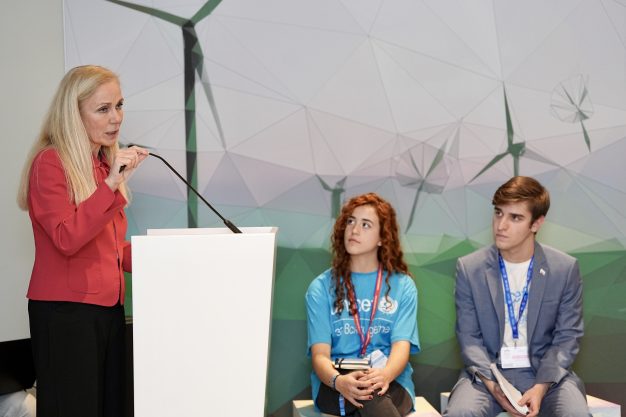
COP28 agreement offers ‘glimmer of hope’ of climate justice for children
The agreements reached at the end of COP28 – namely on the reduction of fossil fuels – provides ‘some glimmers of hope’ for climate justice for children.
But Kitty van der Heijden, Deputy Director of children’s charity UNICEF, said that for words to have action, there now had be a ‘transformative scale of climate financing’.
She was speaking at the end of the fortnight-long event in Dubai, which saw an agreement to ‘transition away’ from fossil fuels towards renewable energies, but which for many fell disappointingly short of a total phasing-out.
In her statement, Ms van der Heijden acknowledged that COP had, for the first time, ‘paid attention to the unique and disproportionate impacts of climate change on children’s health and wellbeing, proposing an ‘expert dialogue’ on this to take place during the official COP process next year’.
This, she said, would ‘pave the way for change for the children bearing the brunt of climate chaos, and UNICEF stands ready to support’.
‘Pave the way for change’
Her statement continued: “Meanwhile, the global goal on adaptation (GGA), which aims to help countries build up defenses to withstand climate hazards, was strengthened for children. By agreeing to new thematic targets on water, health and nutrition, and referencing social protection and education, the COP has sent a strong signal to relevant Ministries that they must build up the climate resilience of services children need, like schools, health, water and sanitation systems. Now, international adaptation finance must be scaled up to make this a reality.
“And where climate adaptation is missing or has failed, children massively lose out. The loss of life and livelihoods caused by unmanaged climate chaos in the present – driven by historic emissions – is a grave intergenerational injustice borne by children. The decision at COP28 to operationalize and capitalise the Loss and Damage Fund was an important step toward addressing this. If implemented well it should mean that children who survive climate disasters can at least count on their schools being rebuilt, child health services restored, and places to live and play made safe.
These are welcome and necessary new commitments – achieved in no small part, thanks to the incredible efforts of youth advocates from all over the world, supported by UNICEF.
“Through the GGA and the Loss and Damage Fund, world leaders are beginning to treat the harmful symptoms of alarming temperature rises. Yet, until we see timely action to keep temperature rises within the 1.5 degree limit, they will not be treating the root causes.
“The Global Stocktake (GST) document has broken new ground by acknowledging that limiting global temperature rises to 1.5 degrees requires drastic reductions in global greenhouse gas emissions and a transition away from fossil fuels. We now urgently need clear timelines for achieving this, consistent with both achieving global net zero and with a fast, fair and child-sensitive transition.
“Another future is still possible. A fast, fair and child-sensitive transition offers children a chance of developing new skills, new jobs and building a clean, secure, prosperous world. Children will not and cannot wait for adults to act, they will lead the change and it is incumbent on adults to help equip them with the skills, resources and opportunities to do so.
‘Time for world leaders to take their responsibilities seriously’
“This year, we were delighted to mark the first ever thematic day for children at COP, and we welcome a stronger role for a Youth Climate Champion, to engage children directly in climate action and the COP process. Giving young people a platform to have their say, is the right thing to do. But it is not enough. If adults stop at ‘passing the mic’ they risk also ‘passing the buck’. It is now time for world leaders to take seriously their responsibilities not only to listen to young people, but to act to protect vulnerable children facing climate chaos, especially the under 10s.
“Over the next 2 years, Governments must prepare and present new national climate action plans, known as Nationally Determined Contributions (NDCs). We urge world leaders to seize this window of opportunity, and work towards making COP30 a children’s COP – where we secure the 1.5 degree temperature limit that the next generation needs, and where all climate mitigation, adaptation, loss and damage and finance plans have children at their heart”.




